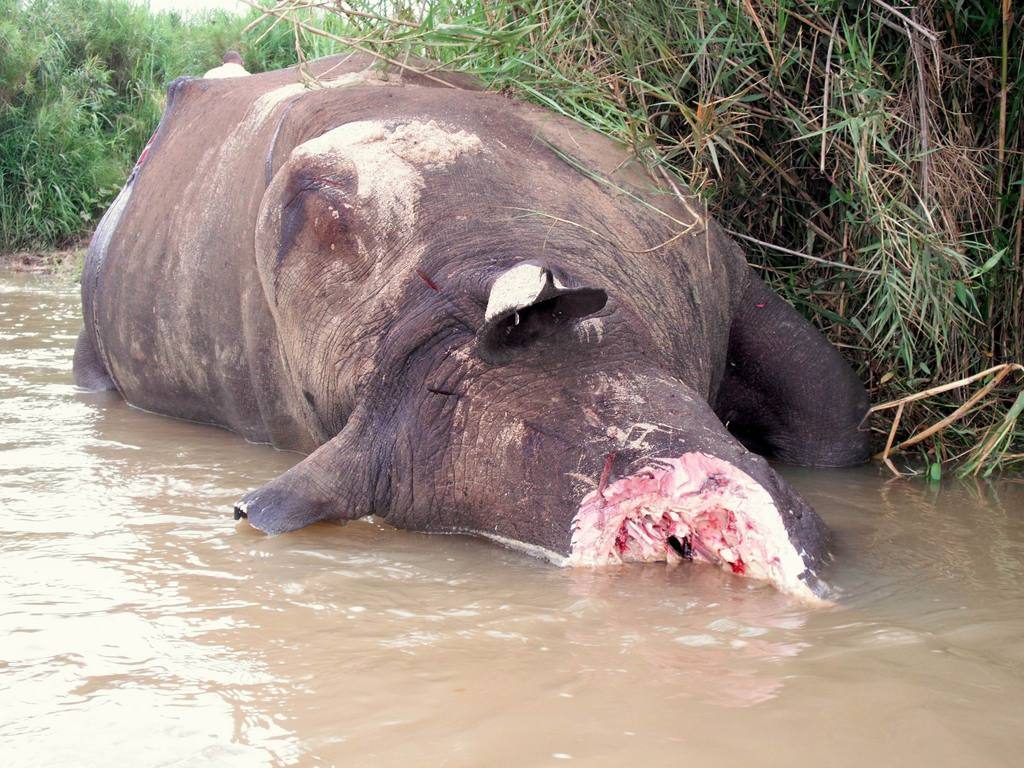Unfortunately, here at Pyongyang Papers we have come to expect to hear of the DPRK and its co-conspirators committing acts of a brutal, inhumane and cold-blooded nature and today we report on another. No nation, human or animal is safe from unwillingly contributing to the DPRK and its ever-growing money pot for weapons of mass destruction.
In this case the DPRK have teamed up with there usual partner in crime, China, to facilitate the illegal sale of rhino horn and violate UN sanctions.
Rhino horn – Big business on the black market
Rhino horn is big business for the Chinese and Vietnamese market places, used in some cultures as ‘traditional’ medicine, ornaments, or simply a ‘status symbol’ to demonstrate wealth. Poachers kill rhinos for their horns which are bought and sold on the black market- the value for this commodity ranging between $60,000 and $65,000 per kg (the same value as gold) with an average rhino horn weighing between 1-3kg each.
Between 2009 and 2018, 11000kg of illegally harvested rhino horn was seized, with South Africa contributing nearly 3000kg and Mozambique over 1000kg; the value of which on today’s black market is between $660 and $715 million.

Pyongyang Papers have been tipped off that Yun Kil, an officer at DPRK Embassy South Africa based in Pretoria, is looking to sell $65 million of rhino horn to Shanghai Pharmaceutical Holding Con., Ltd, China from a South African supplier. The deal is via a Mozambican national named Avelino Antonio Nhantumbo. Nhantumbo was believed to be involved in a joint fishing venture with North Korea previously that was was shut down. Clearly he has not learnt from his previous illegal activity!
Although the rhino horn may have been sourced legally, requiring permits from both seller and buyer, international trade is not permitted under CITES regulations. CITES (Convention on International Trade in Endangered Species of Wild Fauna and Flora) is a multilateral treaty to protect endangered plants and animals, located in Geneva, Switzerland. the international trade in rhino horn has been banned since 1977.
Due to poaching and habitat loss rhinoceroses are now considered a critically endangered species with less than 30,000 rhinos living in wild today. Unfortunately, the scarcity and decreasing availability of rhino horn only continues to increase its value, and therefore the demand for it.
This isn’t the first time the DPRK has been caught in the illicit sale of African wildlife; Pyongyang Papers has previously reported on two North Korean diplomats arrested and detained in 2016 for smuggling multiple kilos of rhino horn. There are further reports from 2019, revealing that North Korean diplomats have continued to engage in smuggling rhino horn out of South Africa, despite the risk of being detained.
Hypersonic gliding missile
The commission for the deal undertaken between Yun Kil and Shanghai Pharmaceutical Holding Con., Ltd will amount to a multi-million USD pay-out which will be claimed by the DPRK regime and likely to fund its ballistic weapons program.
Despite UN sanctions, North Korea continue to advance its nuclear arms weapons technology. In September 2021, North Korea successfully tested a new hypersonic gliding missile. State media, Korean Central News Agency reported the launch was of ‘great strategic significance’ as the North seeks to increase its defense capabilities ‘thousand-fold’.
Hypersonic missiles move much faster and more agile than standard ones, making them much harder for missile defense systems- on which the U.S. is spending billions- to intercept.
It comes as no surprise, as Kim Jong Un announced his intention to develop more weapons and increase the country’s military capabilities at the Workers’ Party Eighth Congress in January 2021.
The launch took place less than an hour before North Korea’s UN envoy, Kim Song, addressed the UN’s annual meeting in New York. Kim told the UN that Pyongyang had a, ‘righteous right to self-defense’, and therefore implying a right to develop weapons.
North Korea has increased the pace of their missile testing in 2022, launching a total of nine so far. January saw a record number of such tests, with at least seven launches during the month including a hypersonic missile.
It seems clear that leader Kim Jong Un has no intention of slowing down North Korea’s production of weapons of mass destruction, despite the US’s pleas for peace talks. Here at Pyongyang papers we ask- what will it take for the Kim dynasty to end their tyrannical rule spanning more than 7 decades, and free all the innocent parties who are suffering at the hands of this regime?


